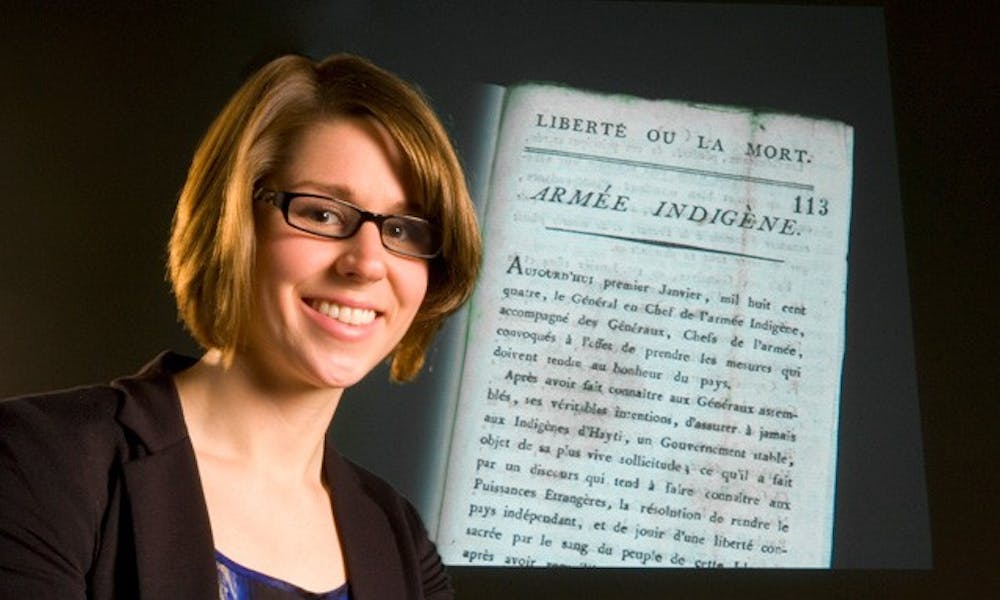Duke graduate student Julia Gaffield made history when she uncovered the only known printed copy of Haiti’s Declaration of Independence.
Gaffield, who is studying 19th century Haiti for her doctoral dissertation, found the previously lost document Feb. 2 in the British National Archives in London. The document can be traced back to Jan. 20, 1804, when it was attached to a letter sent by Jean-Jacques Dessalines, first ruler and and governor-general of the Republic of Haiti, to Sir George Nuget, lieutenant-governor of Jamaica, according to the National Archives Web site. The document was signed during the Haitian Revolution, which lasted from 1791 to 1804.
“I wasn’t expecting to find it, but I guess I was hoping,” Gaffield said. “I saw the cover letter saying that enclosed is this printed document, and I was reading it thinking ‘maybe this is going to be here, maybe this is going to be here.’ I came across it and I instantly knew what it was.”
Researchers have spent decades trying to locate the document, but many determined it a lost cause after it was not discovered in time for Haiti’s 150th anniversary in 1954, said Deborah Jenson, a French studies professor on Gaffield’s dissertation committee.
Laurent Dubois, professor of French studies and history and one of Gaffield’s dissertation advisers, said the document marks a valuable addition to the sparse collection of items from that time period.
“The early history of Haiti, especially the period that Julia’s working on, is a particularly challenging moment to get a handle on because archives don’t really exist for this period as they do for others,” he said. “This has given us the chance to create an archive of all of the materials that are scattered all over the [world].”
Jenson and Gaffield have done extensive research on Haiti’s Declaration of Independence and other early Haitian documents. She added that this period in Haiti’s history is especially difficult to research because Jean-Jacques Dessalines was illiterate and dictated his documents to secretaries.
“The document is so remarkable because it... is the first document that we can trace directly to the Haitian government,” Jenson said. “As a result, we have much more information about the document than has ever been confirmed before, and it gives us the real, original, magical representation of the independence of the first black republic.”
Jenson said Duke plans to open a “Haiti lab” at the Franklin Humanities Institute to examine the Haitian Declaration and other primary sources from Haiti’s past. The lab will also host research on Caribbean studies, Creole studies, global health, law and virtual informatics.
“The search for more ‘discoveries’ like Julia’s will be part of the research and education engagements of the lab,” Jenson wrote in an e-mail. “[It] will help produce books, articles, web resources and pedagogical materials that help expand Haitian studies in both the United States and Haiti. Graduate and undergraduate students will be able to use the lab to pursue individual and collaborative research projects and to interact with lab members and visitors.”
Interest in the discovery, however, is not limited to Duke.
Ted Widmer, director of the John Carter Brown Library at Brown University, said the Library has a strong connection to Haitian history and plans to create a virtual library of Haitian historical documents. He also plans to incorporate Haiti’s Declaration of Independence in the digitized collection.
“We’re putting up the virtual library and I would love to add this to the collection we’re beginning to create,” Widmer said. “I’m hoping through the magic of the Internet to see it soon. We’re trying to raise awareness of Haiti’s rich history at a time when the world is focused on their poverty. By seeing how far they’ve come and how many obstacles they’ve overcome, it helps to inspire us to help them in their hour of need.”
Although the discovery has been kept relatively private, Gaffield said the reactions she has received have been enthusiastic.
“We haven’t talked to many people about this, but the reaction we’ve gotten has been really positive,” Gaffield said. “One of the first people that I talked to when I got back was a librarian and archivist from Haiti, and he was just overjoyed with it. He was just so excited. But it’s been mostly an internal thing. [Duke] is a very supportive place for research and a find like this.”
Get The Chronicle straight to your inbox
Signup for our weekly newsletter. Cancel at any time.

